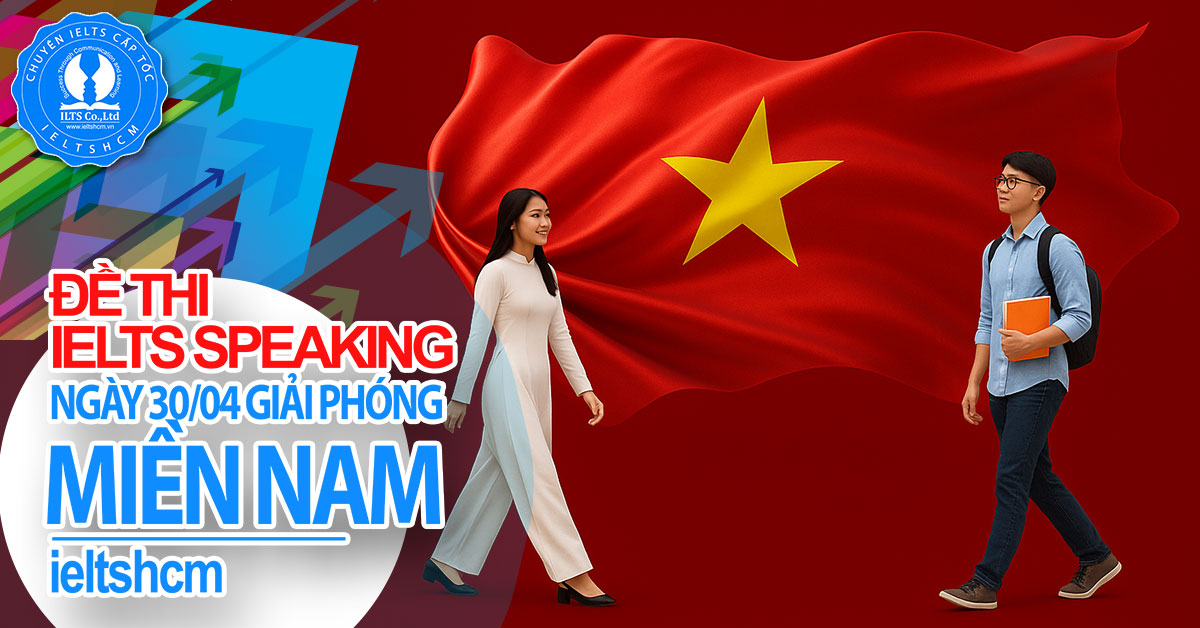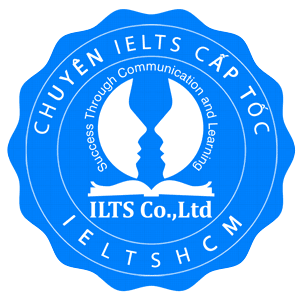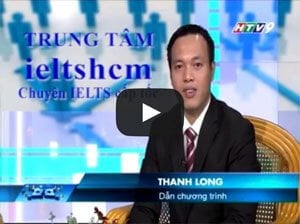Đề thi IELTS Speaking 8.0+ | Ngày Giải Phóng Miền Nam
Khám phá bài mẫu IELTS Speaking 8.0+ cho đề thi IELTS Ngày Giải Phóng Miền Nam 30/4. Gợi ý câu hỏi Part 1-2-3, từ vựng ăn điểm và chiến lược trả lời tự nhiên, cảm xúc. Xem ngay!
Bạn đang tìm kiếm một bài mẫu 30/4 Liberation Day – Đề thi IELTS Speaking 8.0+ | Ngày Giải Phóng Miền Nam ?
Ngày 30/4 – Ngày Giải Phóng Miền Nam, thống nhất đất nước – chính là một đề tài “vàng” để bạn thể hiện khả năng tiếng Anh tự nhiên, cảm xúc và sâu sắc.

Trong bài viết này, IELTSHCM sẽ cung cấp cho bạn bộ câu hỏi mẫu Part 1-2-3, bài mẫu Speaking 8.0+ đầy cảm hứng, từ vựng ăn điểm, và mẹo luyện thi cực kỳ thiết thực.
Cùng khám phá ngay để chinh phục giám khảo và bứt phá điểm số Speaking IELTS nhé!
Câu hỏi Speaking IELTS chủ đề 30/4
Part 1: (Nhẹ nhàng, hỏi sơ khởi)
- Do you know any important national holidays in your country?
- How do people in Vietnam celebrate Liberation Day on April 30th?
- Is April 30th a public holiday in Vietnam? What usually happens on that day?
- Have you ever participated in any activities on April 30th?
Part 2: (Cue card – Nói 2 phút)
Describe a national event that is important to your country.
You should say:
– What the event is
– When and where it happens
– What people do during this event
– And explain why it is important to your country.
(Gợi ý: Bạn chọn sự kiện Ngày Giải phóng Miền Nam – 30/4.)
Part 3: (Discussion sâu hơn)
- Why is it important for a country to commemorate historical events?
- How do national holidays influence people’s sense of identity?
- In what ways do young people learn about historical events in your country?
- Do you think people nowadays appreciate national holidays as much as before? Why or why not?
Bài mẫu Speaking Part 2 – Band 8.0+
(Chủ đề: Ngày Giải phóng miền Nam 30/4)
Cue Card:
Describe a national event that is important to your country.
Sample Answer:
(Tầm 1 phút 50s, tốc độ bình thường nhé)
One of the most significant national events in Vietnam is Liberation Day, which falls on April 30th every year. This day marks the end of the Vietnam War in 1975, when the North and the South were officially reunited.
Liberation Day is celebrated throughout the country, but the biggest events usually take place in major cities like Ho Chi Minh City and Hanoi. There are parades, fireworks displays, and public ceremonies honoring veterans and those who contributed to the country’s reunification. Many families also take the opportunity to spend time together, travel, or simply relax at home.
I personally find this day incredibly meaningful because it reminds us of the tremendous sacrifices that previous generations made for national peace and unity. It’s not just a public holiday; it’s a moment for reflection and gratitude. Every year, when I see the flags flying and the streets bustling with celebratory activities, I feel a deep sense of pride in being Vietnamese.
In my opinion, remembering historical milestones like Liberation Day is essential for fostering patriotism and helping younger generations appreciate the hard-earned freedom they enjoy today.
Một số từ vựng “ăn điểm” cho chủ đề này
- Liberation Day: Ngày Giải phóng
- Reunification: Sự thống nhất
- Historical milestone: Cột mốc lịch sử
- Veterans: Cựu chiến binh
- Commemorate: Tưởng nhớ, kỷ niệm
- Patriotism: Lòng yêu nước
- Sacrifice: Sự hy sinh
- Hard-earned freedom: Tự do đánh đổi bằng máu và nước mắt
- Reflect on the past: Suy ngẫm về quá khứ
- Show gratitude: Bày tỏ lòng biết ơn
Tuyệt vời!
Mình làm luôn bài mẫu Speaking Part 2 – Band 8.5+, với phong cách đời thường mà vẫn cảm xúc tự nhiên, giống kiểu một người Việt đi thi IELTS nhưng có chiều sâu á.
Cứ hình dung lúc thi, bạn nói như kể chuyện một cách chân thành vậy.
Bài mẫu IELTS Speaking Part 2:
Describe a national event that is important to your country.
Sample Answer (Band 8.5+ – Tự nhiên, cảm xúc, dùng nhiều từ “high-level”)
Honestly, one national event that really holds a special place in every Vietnamese person’s heart is Liberation Day, which falls on April 30th. It’s the day when, back in 1975, our country finally ended a long and devastating war and achieved reunification.
In Vietnam, Liberation Day is a public holiday, and it’s celebrated nationwide. You’ll see national flags flying everywhere – on houses, on the streets, even on buses and taxis. In big cities like Ho Chi Minh City and Hanoi, there are parades, art performances, and sometimes breathtaking fireworks at night.
For me personally, this day is more than just a day off work. Every year, my family gathers together, and my grandfather, who is a veteran, usually shares his memories about the war. Even though I’ve heard those stories so many times, they never fail to move me. His words remind me how much blood, sweat, and tears were shed so that today, we can live peacefully.
What I love about Liberation Day is that it brings people closer together. It’s a time when we slow down, reflect on our past, and appreciate the freedom we often take for granted. In a world that’s moving so fast, having a day like this to pause and be grateful feels more important than ever.
In short, Liberation Day is not only a historical milestone but also a living reminder of unity, resilience, and hope – values that still define Vietnam today.
Một vài điểm nổi bật của bài này:
- Có mở bài – thân bài – kết bài rõ ràng.
- Dùng nhiều cụm từ cấp cao:
- holds a special place in every Vietnamese person’s heart
- blood, sweat, and tears were shed
- freedom we often take for granted
- living reminder of unity, resilience, and hope
- Chèn thêm cảm xúc cá nhân, nhắc về ông nội (veteran) → Tạo chiều sâu, tăng điểm fluency và coherence.
Quá đỉnh, mình làm luôn đây!
Dưới đây là Speaking Part 3 mẫu – chủ đề xoay quanh Ngày Giải phóng miền Nam 30/4 + ý nghĩa các sự kiện lịch sử – theo chuẩn Band 8.5+.
Mình sẽ ghi cả câu hỏi + bài mẫu trả lời để bạn tập luôn nhé.
IELTS Speaking Part 3
Chủ đề: Remembering History & National Holidays
Why is it important for a country to commemorate historical events?
Sample Answer:
I believe commemorating historical events is crucial because it helps preserve national identity and collective memory. Without remembering the past, we might lose sight of the sacrifices and struggles that shaped who we are today.
Celebrations like Liberation Day remind us that freedom and peace weren’t simply handed to us; they were earned through resilience and determination. Moreover, such events can foster a sense of pride, unity, and belonging among citizens, which is especially important in an increasingly globalized world.
How do national holidays influence people’s sense of identity?
Sample Answer:
National holidays act like emotional anchors. They reconnect people with their roots, history, and shared values.
For example, during Liberation Day, when I see the streets filled with red flags and people gathering for celebrations, I feel a strong sense of patriotism. It reminds me that despite our differences in background or beliefs, we are all part of one nation.
In a way, national holidays keep the spirit of unity alive and strengthen people’s connection to their homeland.
In what ways do young people learn about historical events in your country?
Sample Answer:
In Vietnam, young people learn about historical events mainly through formal education, such as history classes in school.
However, I think personal storytelling from older generations is equally, if not more, impactful. Listening to real-life experiences from grandparents or veterans makes history come alive in a way textbooks simply can’t replicate.
Besides, with the rise of social media, documentaries, podcasts, and even movies about history have become popular ways for the younger generation to engage with the past.
Do you think people nowadays appreciate national holidays as much as before? Why or why not?
Sample Answer:
To be honest, I think appreciation for national holidays is a bit mixed these days.
Some people, especially the older generations, still see these days as sacred moments for reflection and gratitude. Meanwhile, younger people might view them more as chances for relaxation or travel rather than remembering the historical significance.
That being said, I don’t think it’s because young people are careless. It’s just that modern life is so fast-paced and overwhelming that unless efforts are made to keep history relevant and engaging, it’s easy for its deeper meaning to fade into the background.
Một số cụm từ “xịn xò” bạn có thể dùng lại:
| Từ/Cụm từ | Nghĩa |
|---|---|
| preserve national identity | gìn giữ bản sắc dân tộc |
| collective memory | ký ức tập thể |
| emotional anchors | điểm neo cảm xúc |
| foster a sense of pride and unity | nuôi dưỡng niềm tự hào và sự đoàn kết |
| overwhelming pace of modern life | nhịp sống hiện đại quá nhanh và áp lực |
| keep history relevant and engaging | khiến lịch sử trở nên sống động và gần gũi |
Tổng kết nhỏ cho bạn:
✅ Part 2: Kể chuyện + Cảm xúc cá nhân
✅ Part 3: Phân tích sâu + Từ vựng mạnh + Câu mạch lạc
Bạn hoàn toàn có thể bấm thời gian tập nói theo bộ này – đảm bảo lúc đi thi tự tin, tự nhiên và rất dễ ăn Band 8.0+!



